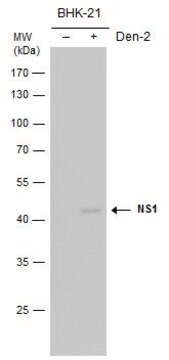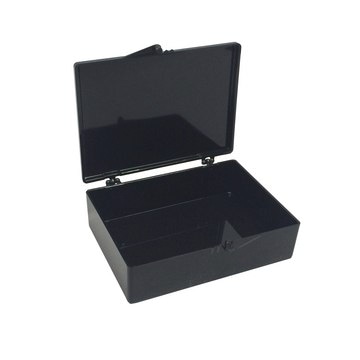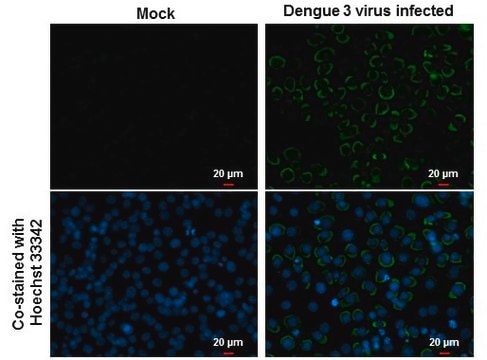MABF2218
Anti-Influenza A Virus NSP1 Antibody, clone 2H6
About This Item
IF
Neutral
WB
inhibition assay
immunofluorescence: suitable
inhibition assay: suitable
neutralization: suitable
western blot: suitable
Recommended Products
biological source
mouse
Quality Level
conjugate
unconjugated
antibody form
purified antibody
antibody product type
primary antibodies, primary antibodies
clone
2H6, monoclonal
mol wt
calculated mol wt 25.47 kDa
observed mol wt ~35 kDa
purified by
using protein G
species reactivity
influenza A virus
packaging
antibody small pack of 100 μg
technique(s)
ELISA: suitable
immunofluorescence: suitable
inhibition assay: suitable
neutralization: suitable
western blot: suitable
isotype
IgG1κ
epitope sequence
N-terminal
UniProt accession no.
shipped in
dry ice
target post-translational modification
unmodified
Gene Information
vaccinia virus ... NS1(956533)
Related Categories
General description
Specificity
Immunogen
Application
Evaluated by Western Blotting with recombinant Influenza A virus non-structural (NS1) protein .
Western Blotting Analysis: A 1:1,000 dilution of this antibody detected recombinant Influenza A Virus NS1 protein.
Tested Applications
Immunofluorescence Analysis: A representative lot detected Influenza A Virus NS1 protein in Immunofluorescence applications. (Tan, Z., et al. (2010). J Med Virol. 82(3):467-75; Wu, J., et al. (2016). Sci Rep.;6:33382).
Surface plasmon resonance: A representative lot detected Influenza A Virus NS1 protein in Surface plasmon resonance applications. (Barnwal, B., et al. (2015). Antiviral Res. 116:55-61).
Western Blotting Analysis: A representative lot detected Influenza A Virus NS1 protein in Western Blotting applications (Tan, Z., et al. (2010). J Med Virol. 82(3):467-75; Wu, J., et al. (2016). Sci Rep. 6:33382).
Neutralizing: A representative lot of this antibody bound NS1 and reduced influenza A virus replication. (Barnwal, B., et al. (2015). Antiviral Res. 116: 55-61).
ELISA Analysis: A representative lot detected Influenza A Virus NSP1 in ELISA applications (Barnwal, B., et al. (2015). Antiviral Res. 116:55-61; Wu, J., et al. (2016). Sci Rep. 6: 33382).
Inhibition Assay: A representative lot of this antibody inhibited the interaction between NS1 and dsRNA. (Wu, J., et al. (2016). Sci Rep. 6:33382).
Note: Actual optimal working dilutions must be determined by end user as specimens, and experimental conditions may vary with the end user
Physical form
Storage and Stability
Other Notes
Disclaimer
recommended
Storage Class Code
12 - Non Combustible Liquids
WGK
WGK 2
Flash Point(F)
Not applicable
Flash Point(C)
Not applicable
Certificates of Analysis (COA)
Search for Certificates of Analysis (COA) by entering the products Lot/Batch Number. Lot and Batch Numbers can be found on a product’s label following the words ‘Lot’ or ‘Batch’.
Already Own This Product?
Find documentation for the products that you have recently purchased in the Document Library.
Our team of scientists has experience in all areas of research including Life Science, Material Science, Chemical Synthesis, Chromatography, Analytical and many others.
Contact Technical Service








